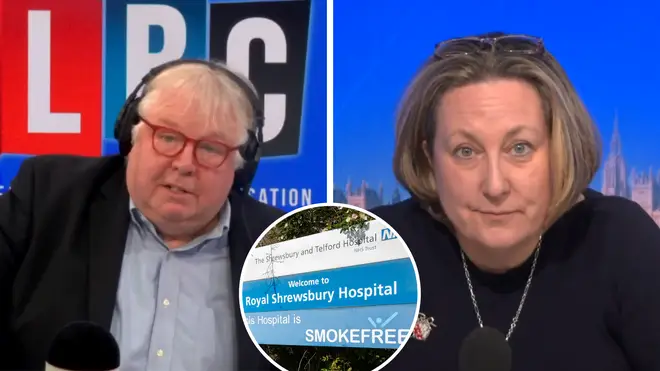
Rachel Johnson 7pm - 10pm
31 March 2022, 08:52

A Government minister has welcomed the findings of the damning report into the Shrewsbury maternity scandal, and spoke of the traumatic three-day birth of her son where she herself was denied a C-section.
The Secretary of State for International Trade told LBC the report was "heartrending to read" and said NHS maternity units must be 'gold standard' as she recalled her own experiences giving birth.
Appearing on Nick Ferrari at Breakfast, Anne-Marie Trevelyan was asked how she felt reading the headline "child birth is not safe for women in England".
Ms Trevelyan said: "Honestly Nick, that report is heartrending to read and actually it reminds me, I was looking at it last night, it brought back memories to me.
"So my eldest, who is about to be 22 and is a very healthy young man, and I’m so blessed to have him, but his birth was incredibly difficult.
"It took three days, and I was told at the time a caesarean wasn’t going to be the thing and there were those afterwards who said, you know that was ridiculous, that is absolutely what you should have had.
"It was a very difficult birth, I was left very damaged, he fortunately was fine but I read this stories, and I mean all credits to Ockendon, what an incredibly difficult report to pull together but the challenge she has set is absolutely right, 100 per cent right.
Read more: 'Justice is coming for every baby' in maternity scandal of 200 deaths, families vow
Read more: Shrewsbury maternity scandal: 'Failing to listen to women led to 201 babies' deaths'

Minister tells of her own pregnancy ordeal
"We must make sure our maternity services across the UK are gold standard."
Nick then went on to ask "what the overbearing memory" of her birth is.
"Pain. It was a very, very long three days of my life. But as ever when one is lucky enough to have a miraculous child land safely at the end of it, you deal with it all because you are so blessed," she said.
Her comments come after a report found some 201 babies and nine mothers could have - or would have - survived if an NHS trust had provided better care.
Detectives working alongside and liaising with the Ockenden Report team are now looking into approximately 600 cases, the Health Secretary told Parliament yesterday.
Shrewsbury and Telford Hospital NHS Trust presided over catastrophic failings for 20 years - and did not learn from its own inadequate investigations - which led to babies being stillborn, dying shortly after birth or being left severely brain damaged.
Read more: Justice Sec to challenge parole board decision to free Baby P's mother Tracey Connelly
Read more: 'Sick joke': Anger as free hospital parking for NHS staff axed from Friday

QC argues against prosecuting anyone from Shrewsbury and Telford trust
Some babies suffered skull fractures, broken bones or developed cerebral palsy after traumatic forceps deliveries, while others were starved of oxygen and experienced life-changing brain injuries.
Several mothers were made to have natural births despite the fact they should have been offered a Caesarean.
The damning report, led by maternity expert Donna Ockenden, examined cases involving 1,486 families, mostly from 2000 to 2019, and reviewed 1,592 clinical incidents.
A review of 498 stillbirths found one in four had "significant or major concerns" over the maternity care given, which, if managed appropriately, might, or would have, resulted in a different outcome. Some 40% of these stillbirths were never investigated by the trust.
There were also "significant or major" concerns over the care given to mothers in two-thirds of cases where the baby had been deprived of oxygen during birth.
Overall, there were also 29 recorded cases where babies suffered severe brain injuries and 65 cases of cerebral palsy. Furthermore, nearly a third of neonatal deaths had "significant or major concerns" over care. Yet the trust had only looked at 43% of these.
Overall, 12 deaths of mothers were investigated, none of whom received care in line with best practice at the time. In three-quarters of these cases, care "could have been significantly improved".
Some women were blamed for their own deaths, the report found, while incidents that should have triggered a serious incident investigation were "inappropriately downgraded" by the trust to its own series of "high risk" case reviews, which were "apparently to avoid external scrutiny".
Ms Ockenden's report said this "meant that the true scale of serious incidents within maternity services at the trust went unknown over a long period of time".
But she added there were still "persistent failings in incident investigations as late as 2018-2019".